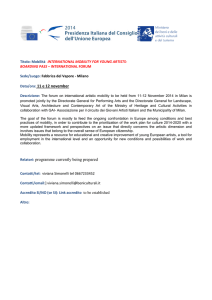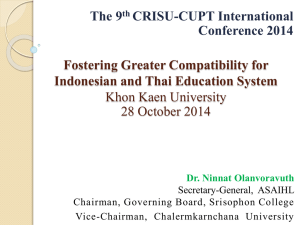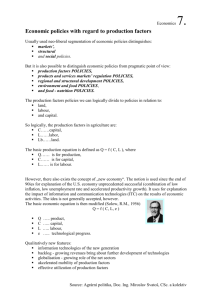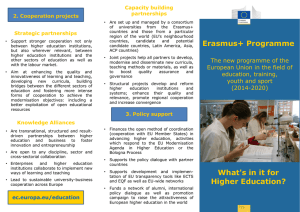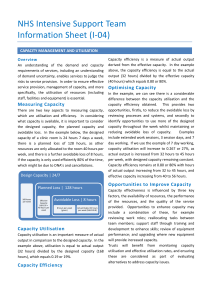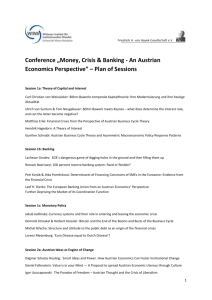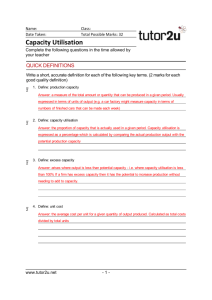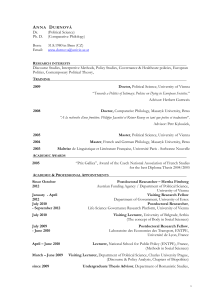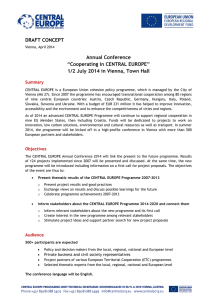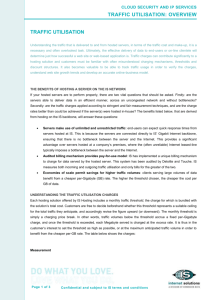Presentation on URBAN EUROPE
advertisement
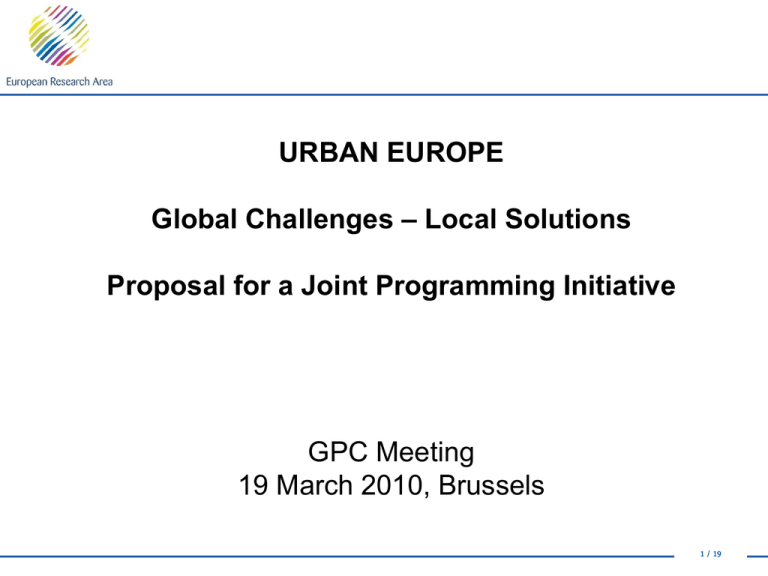
URBAN EUROPE Global Challenges – Local Solutions Proposal for a Joint Programming Initiative GPC Meeting 19 March 2010, Brussels 1 / 19 Urban Europe – Global Challenges Society Economy Ageing Segregation Brain drain Stagnation Mobility Ecology Congestion Emission Climate change Degradation 2 / 19 Urban Europe – Society Trends in Urbanisation in Europe 1950-2050, UN 2009 100% International migration makes up 1/3 of urban growth 84% 80% 66% 60% 40% 72% 76% Rapidly ageing population and proportion of 60+ 51% (Re) Emergence of problems as poverty, homelessness, crime 20% 0% 1950 1975 2007 2025 2050 3 / 19 Urban Europe – Economy and Innovation GDP per capita in PPS Urban Areas are the centres of economic and innovative activities (80% of GDP, R&D) Increasing global competition Considerable disparities between and within urban areas 4 / 19 Urban Europe – Mobility Congestion in urban areas costs 100 billion Euro or 1% of the EU's GDP annually Urban areas - 40% of all CO² emissions of road transport Road accidents: health effects, damage to vehicles, expenditure for police and emergency service 5 / 19 Urban Europe – Mobility Urban Passenger Transport CO² per capita (UN 2008) 6 / 19 Urban Europe – Ecology Urban Ecology and Climate Change (UN 2008) Higher temperatures in urban areas “heat island” effect Direct effect on the energy consumed by cooling appliances Peak electricity load increases 3-5% for a 1°C increase in temperature 7 / 19 Urban Europe at the Crossroads: Quo Vadis? 8 / 19 Urban Europe – Local Solutions 100% 84% 80% 66% 60% 40% 72% Social Cohesion and Integration 76% 51% 20% 0% 1950 1975 2007 2025 2050 Innovation Hubs and Living Labs Intelligent intra- and inter-urban Transport, Logistic and Communication Systems Sustainability and Minimization of Ecological Footprint 9 / 19 Urban Europe – A Systemic Approach New Governance models New Urban Policies Prospering European Areas Spatio-temporal urban planning concepts Social Cohesion and Integration Awareness Rising Instruments Innovation Hubs and Living Labs Participatory Policy Development Intelligent intra- and inter-urban Transport, Logistic and Communication Systems Feedback Loops Sustainability and Minimisation of Ecological Footprint Transport and Mobility System Energy Supply Utilisation of emerging technologies ICT System Water & Waste Management Construction and Control Systems for Buildings 10 / 19 Urban Europe – Modules Module 1 Understanding Urban Systems Urban Scenarios Foresight Activities Module 2 Implications for urban policies Policy Initiatives for Technology Development Planning Processes Roadmaps Transport Energy Innovation and Growth Buildings and Construction Module 3 Utilisation of new technologies and governance solutions Benchmarking and Monitoring Evaluation and Validation Demonstration Pilot Projects 11 / 19 Urban Europe - Research Issues Module 1 Understanding urban systems Develop integrated models for simulation and optimisation of urban development scenarios: operational methodologies for foresight experiments on urban issues Create and Integrate Data Bases: as a basis for evidence-based policies. Utilise the wealth of data on urban and transport issues (e.g. Eurostat, Urban Audit) 12 / 19 Urban Europe - Research Issues Module 2 Implications for urban policies in the 21st century New planning, management and governance models leading to “cities as service centres” and “cities of excellence” Participatory Policy Approaches Planning for and designing “zero slums & deprived areas” Integration concepts of social (and ethnic) groups Spatio-temporal planning for land use systems 13 / 19 Urban Europe - Research Issues Module 3 Utilisation of new technologies and governance solutions Co-modal transportation systems on local, regional and international levels: environmentally friendly, safe, sustainable, available Zero tolerance of fatalities and injuries (sensor web, web2.0) Smart Grids, electric mobility (i.e. electric vehicles, hybrid electric vehicles, plug-in hybrid electric vehicles, hydrogen/fuel cells) Model-cities and demonstration projects: e.g. Stockholm (ecocities), Amsterdam (modal split), Vienna (eco-renovation), Mannheim (smart grids) New housing and building concepts (intelligent homes, energy efficient buildings, smart cities) 14 / 19 Urban Europe – Adds Value to Quality of Life Reinforcing European competitiveness – mobilising the advantages of European urban agglomerations and of new technologies in urban contexts Helping to address grand challenges in an urban context and ensure liveability and inclusiveness of European urban areas to European Competitiveness to European Knowledge Developing and aligning strategically oriented research and human capital Creating applicable and feasible Tools and Instruments for Policy Makers 15 / 19 Urban Europe – Joining Forces Proposing countries (10) Austria, The Netherlands, Finland, France, Ireland, Italy, Sweden, Switzerland, Turkey, Spain (to be confirmed) Interested countries (9) Belgium, Bulgaria, Denmark, Estonia, Malta, Norway, Romania, Slovenia, United Kingdom 16 / 19 Urban Europe – Getting involved 40 institutions and networks from 17 countries 7 September 2009, Brussels 1 October 2009, Vienna 17 February 2010, Vienna 3/4 March 2010, Brussels Coordinated by Austrian Ministry of Science and Research Austrian Ministry of Transport, Innovation and Technology Dutch Ministry of Transport, Public Work and Water Management 17 / 19 Urban Europe – Creating Complementary Approaches Involved Initiatives ERA-net “urban-net” European Energy Research Alliance (EERA) Trans European Transport Networks (TEN-T) ERA-net “transport” The Freight Logistics Package 2007 European Construction Technology Platform (ECTP) POLIS 18 / 19 Urban Europe – Contact Points Margit Noll Austrian Institute for Technology, Austria Margit.Noll@ait.ac.at Wolfgang Polt Joanneum Research, Austria Wolfgang.Polt@joanneum.at 19 / 19
